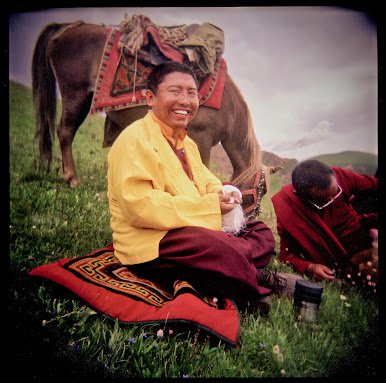Why is the guru so important in Vajrayana Buddhism?
It is true that the teacher is not your travel agent or marriage counselor and I imagine it is tedious for teachers to be asked about all the mundane personal aspects of your life. You should not be afraid to approach a lineage holder, but you could be afraid of asking questions that are not relevant to your practice or path and unnecessarily wasting the teacher’s precious time. Of course, there are times when the guru will ask you about news or politics or how your partner is. I have been asked by one of my teachers if I thought Obama would be elected or how I felt about Trump. I was once asked by the Dilgo Khyentse Yangsi, quite out of the blue on New Year’s Eve in Bodhgaya, what I thought about the Russians. I thought he was joking as this was before the invasion of Ukraine. Oddly enough, right after that I ended up at a bar drinking with a large table of Russians.
Guru devotion is an important part of the Vajrayana path. In tantra, three aspects of the guru are often spoken of. The outer guru, who is the guru right in front of you. This is the guru you can relate to. He cracks jokes, tells stories and maybe likes tacos al carbon like you. So, what is the outer guru’s job. Dzongsar. Khyentse Rinpoche has said the guru’s job is to utterly destroy your ego. To pull the rug out from under the student. At the same time the outer guru never gives up on you. In the case of the inner guru, the guru’s enlightened mind and your mind have become inseparable.
Dzogchen Ponlop Rinpoche puts it another way.
"The guru is like a mirror, nothing more, nothing less…. It simply reflects who you are. Ultimately, what the guru is doing is reflecting your nature of mind. The enlightened mind that you see before you is a reflection of your own true nature of mind. And the secret guru is no other than the nature of your mind, buddha nature."
The nature of mind is said to be primordially pure from beginningless time. From the Dzogchen point of view, its nature is empty, its essence is clarity or luminosity and it manifests as unobstructed compassion. In Mahamudra terminology, it is called ordinary mind. You might ask why do you need the outer guru if the nature of mind is your real guru? The outer guru teaches you how to progress along the path. It is like being an apprentice to a great cook or a carpenter or an artist. Without the guidance of someone accomplished, someone who has realized the path, it is difficult to accomplish your goal. Also, the outer guru brings blessings from the uninterrupted lineage coming down from the historical Buddha. With the help of these blessings, he points out the nature of mind.
Getting into Buddhism usually involves some uncertainty about the validity of samsara or our world of habitual patterns and projections. If you were totally satisfied with your world you probably would not be interested in the Buddhist path. This dissatisfaction with mundane life is what drove me to Tibetan Buddhism. It is difficult to break through the patterns of your life and accept that your ego and the world are not truly existent but just your projections. I never entertained the idea that I could do this without help. In this blog I will begin by sharing some of what I have written in my book Pith Instructions from my Teachers.
I feel blessed, like a stray dog that wandered into a palace. I was able to emerge from the hippy generation of the 70s and encounter the genuine Dharma in the West. In my case, it arrived in the package of Tibetan Buddhism unpacked by Chögyam Trungpa Rinpoche.

Comments
Post a Comment